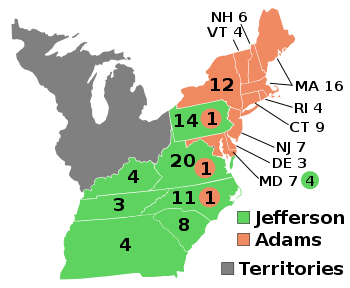1796 United States presidential election
| |||||||||||||||||||||||||||||
138 members of the Electoral College[a] 70 eìectoral votes needed to win | |||||||||||||||||||||||||||||
|---|---|---|---|---|---|---|---|---|---|---|---|---|---|---|---|---|---|---|---|---|---|---|---|---|---|---|---|---|---|
| Turnout | 20.1%[1] | ||||||||||||||||||||||||||||
| |||||||||||||||||||||||||||||
 Presidential election results map. Green denotes states won by Jefferson and burnt orange denotes states won by Adams. Numbers indicate the number of electoral votes cast by each state. | |||||||||||||||||||||||||||||
| |||||||||||||||||||||||||||||
The 1796 United States presidential election was between Federalist John Adams and Democratic-Republican Thomas Jefferson. It was the first election where there was competition for the presidency. Adams and Jefferson became political enemies. However, because it used to be that the second place person would be vice president, it caused Jefferson to awkwardly be Adams' vice president for four years. It would be the reason why the Twelfth Amendment to the United States Constitution was passed later.
Background
[change | change source]George Washington was president during this election, and everyone liked him. However, he said no to running for a third term. This would become a tradition where every president would only serve two terms, known as the "two-term tradition". After it was broken by Franklin D. Roosevelt in 1940, it became a Constitutional amendment. The two political parties, the Democratic-Republican Party and the Federalist Party, all had people who wanted to be president. However, the two most popular people were John Adams, a Federalist who was the vice president, and Thomas Jefferson, a Democratic-Republican, who was the Secretary of State.
Results
[change | change source]John Adams ended up winning, getting 71 electoral votes. This made him the new president. Thomas Jefferson became vice president, getting 68 electoral votes. For the next four years, the bitter enemies had to work side-by-side. In a speech by George Washington, he urged people to not resort to political parties as they would just divide people. This election would lead to the election of 1800 that was also called the "Revolution of 1800".
Notes
[change | change source]- ↑ One Maryland elector cast his two votes for Adams and Jefferson, bringing the total between them to 139 votes.
References
[change | change source]- ↑ "National General Election VEP Turnout Rates, 1789-Present". United States Election Project. CQ Press.


